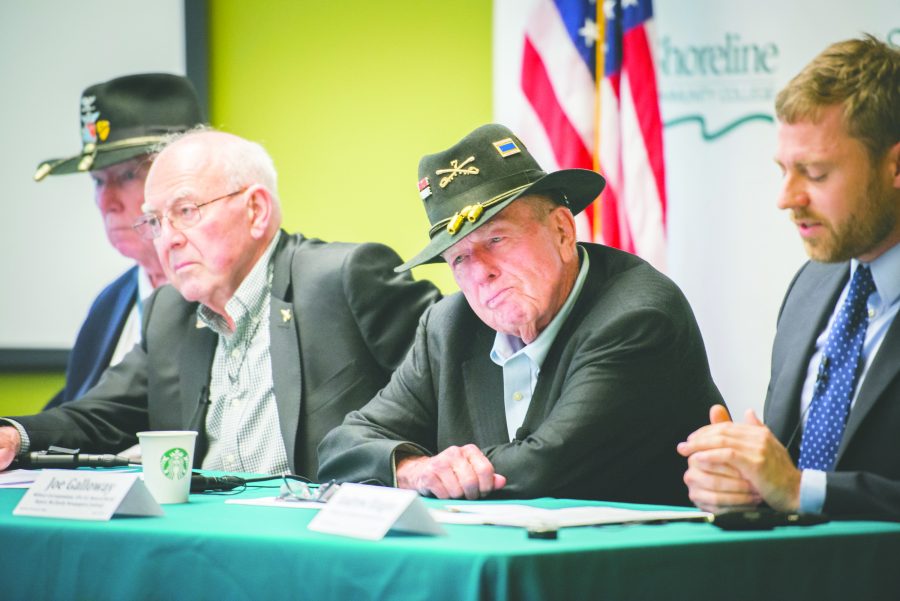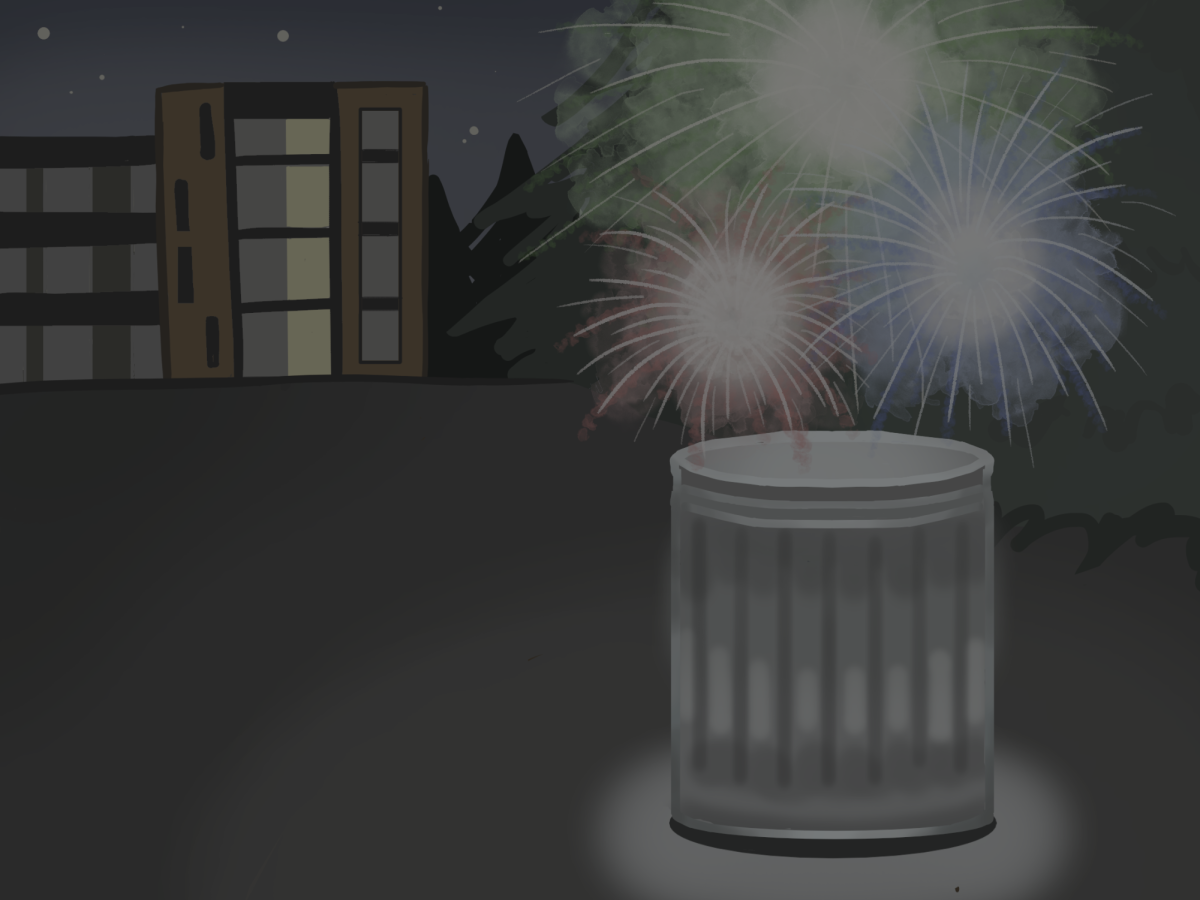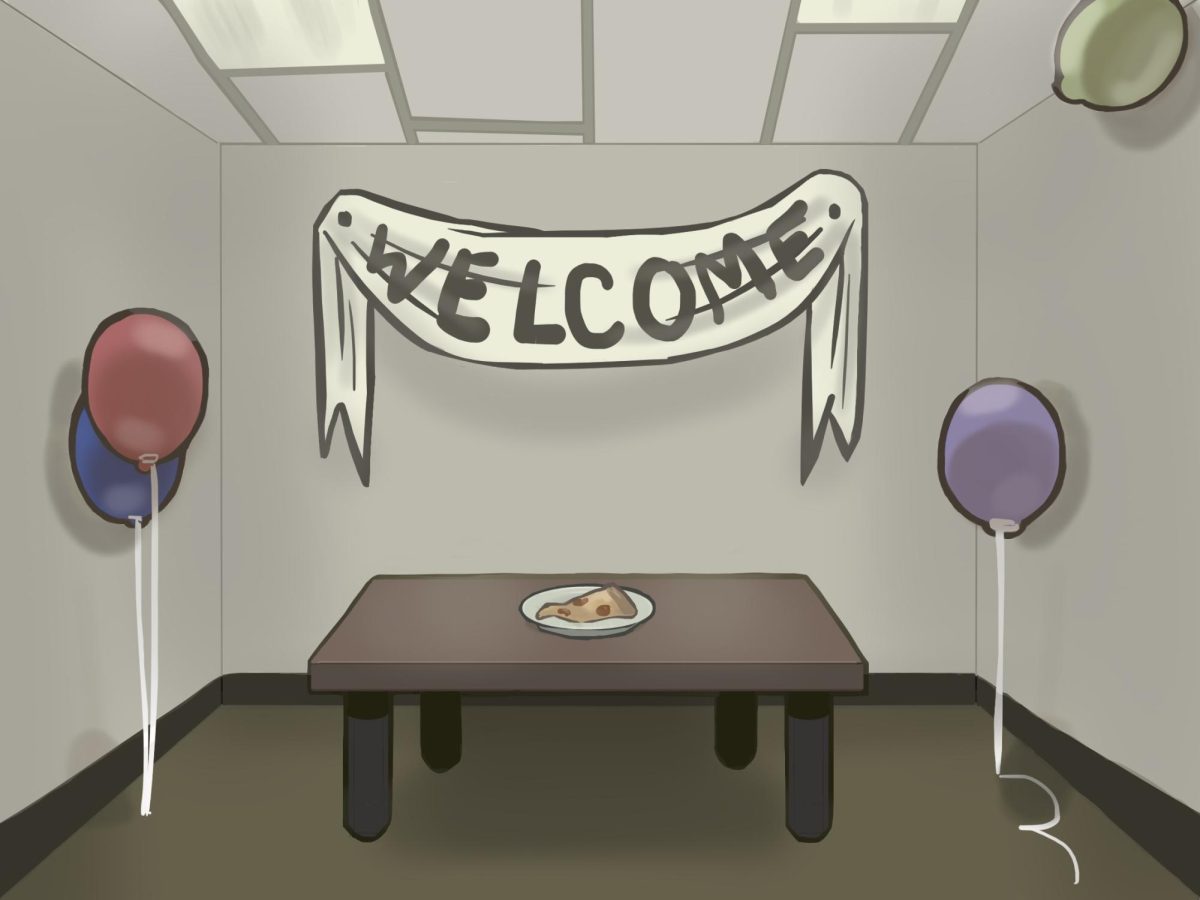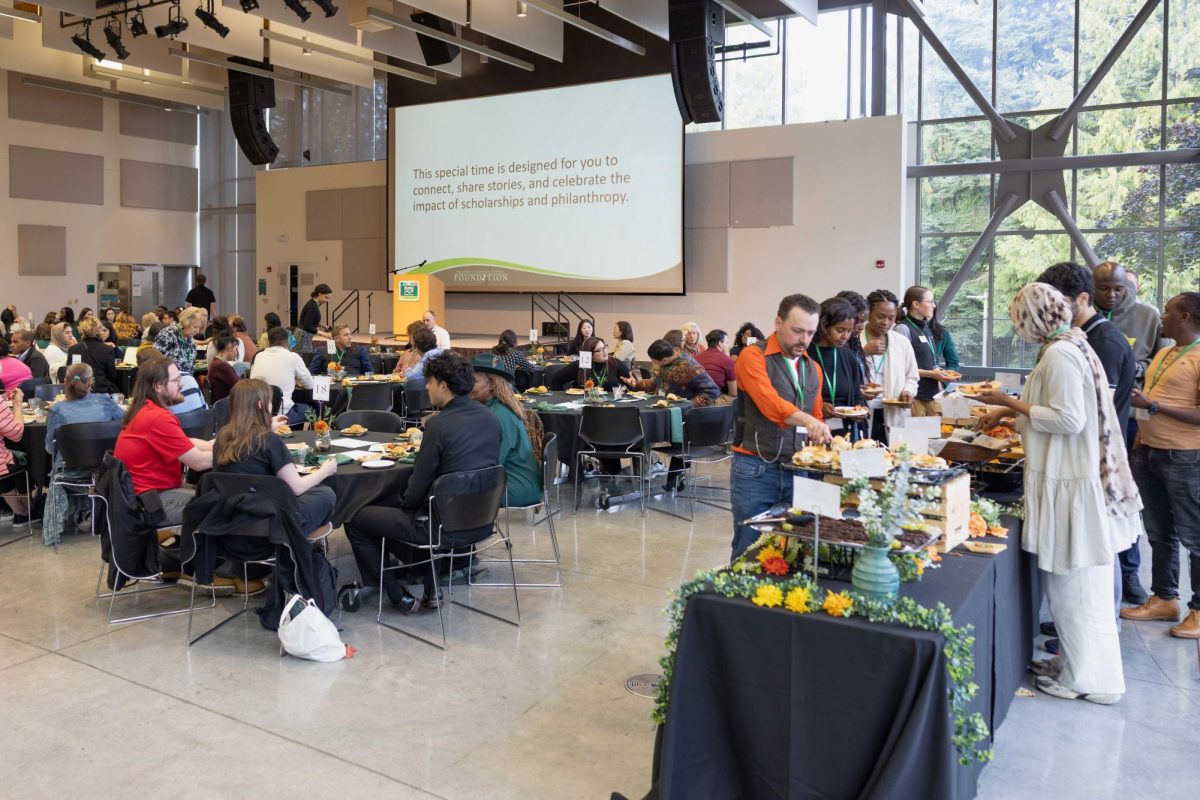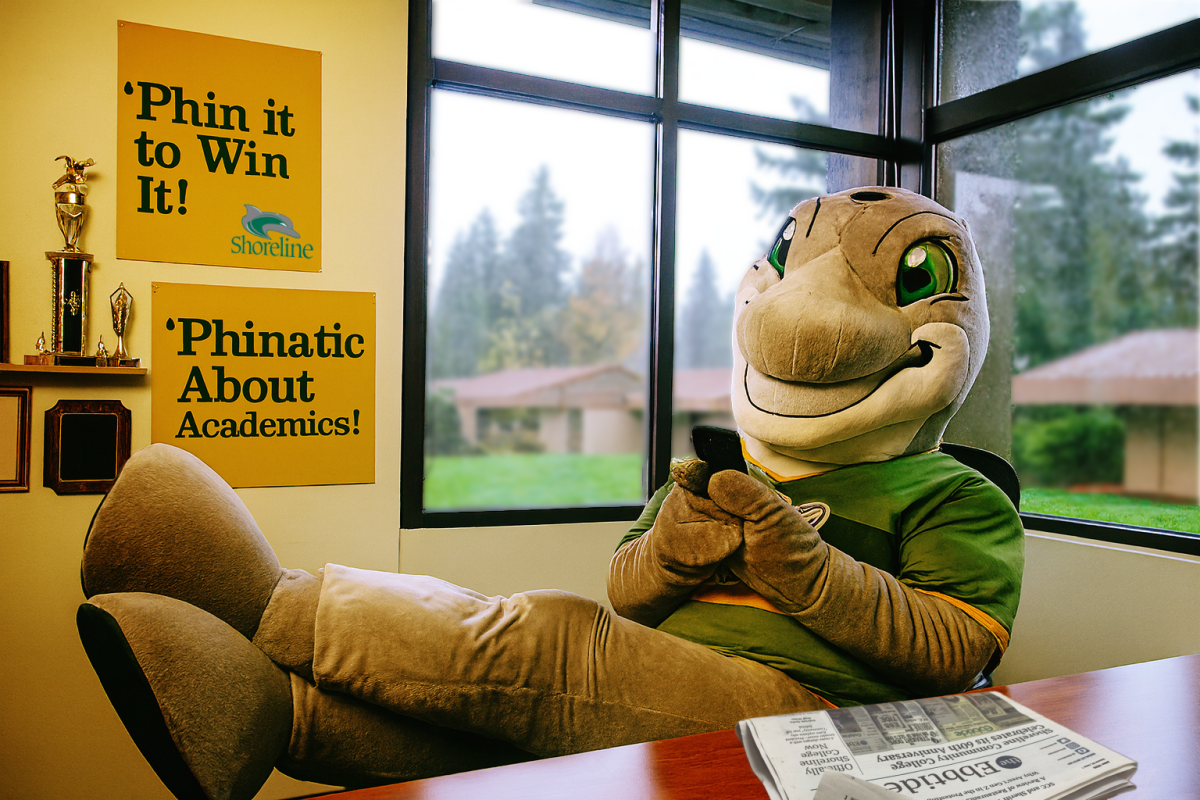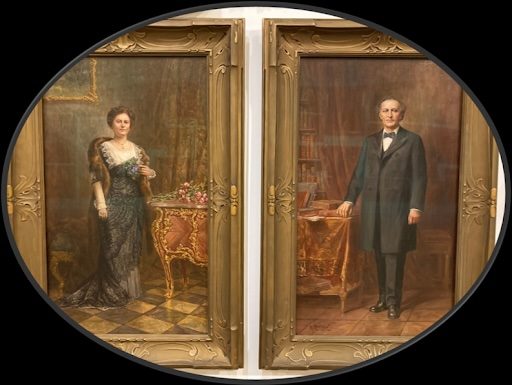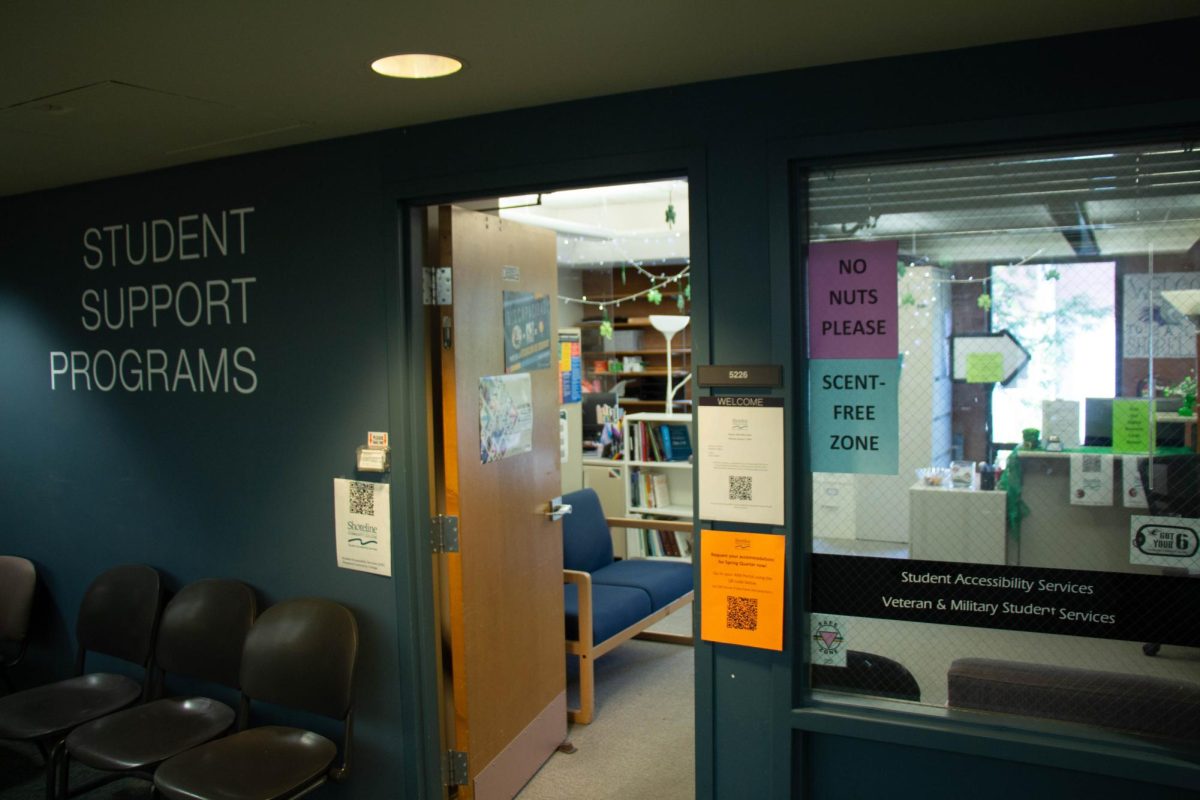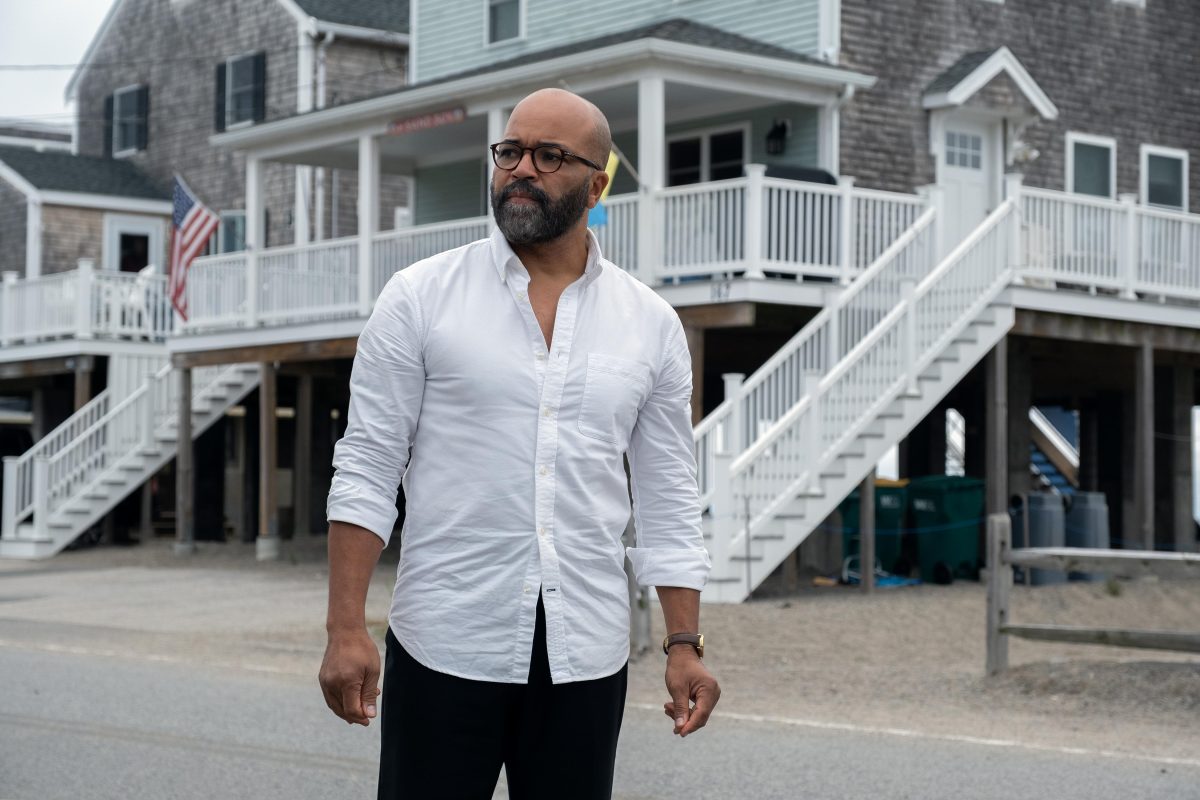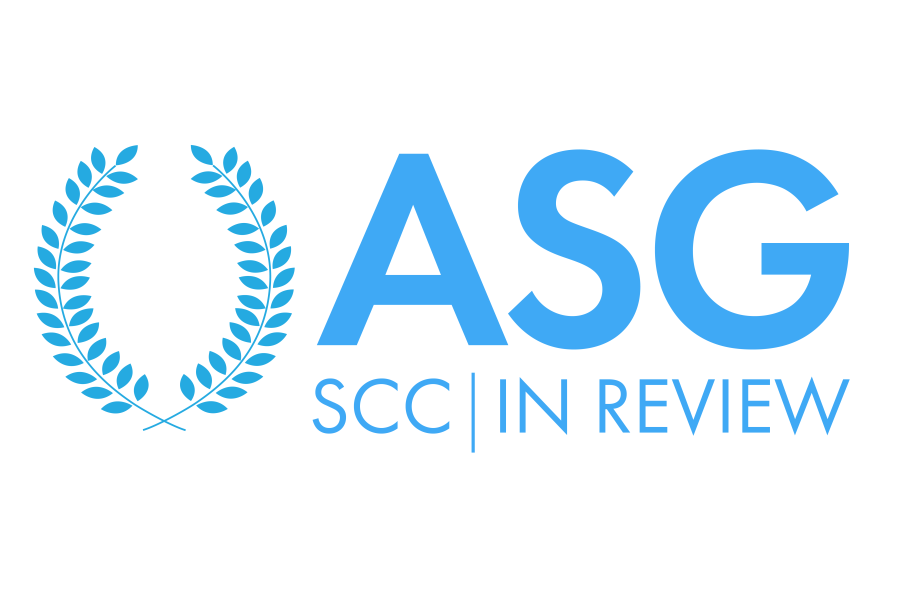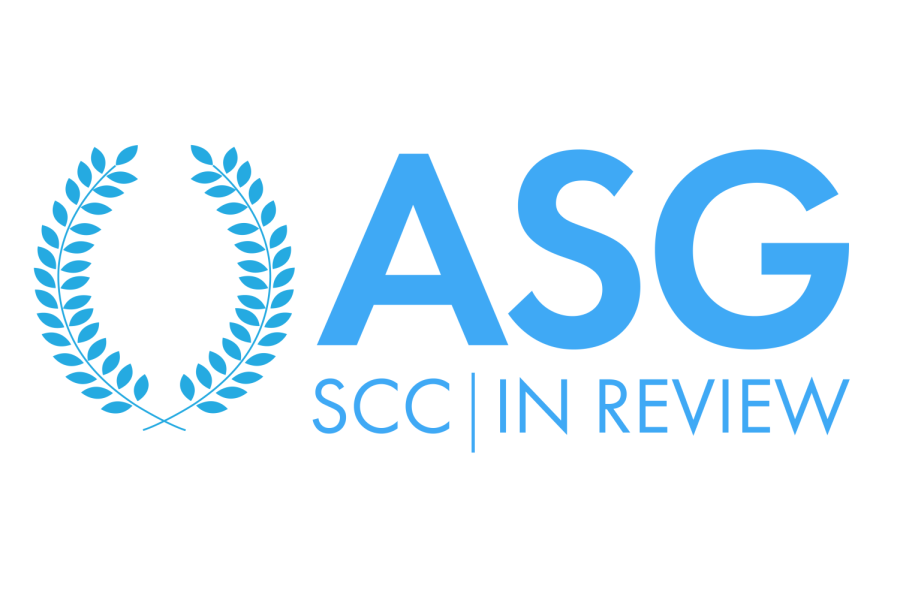With a backdrop of photographs from their youth spent at war, three panelists settled into seats on a stage raised in front of a full SCC audience in the Quiet Dining Room on the Tuesday before Memorial Day.
The Vietnam War Commemoration organized this panel, moderated by historian Andrew Ringlee. The panelists were Colonel Bruce Crandall of the U.S. Army (ret.), who served in Vietnam ‘65-’66; Captain Joe Crecca of the U.S. Air Force (ret.) who served in Vietnam ‘65-’73, and who was a prisoner of war for six years; and Joe Galloway, a journalist who served four tours as a war correspondent in Vietnam, received a Bronze Star and co-authored “We Were Soldiers Once … and Young.”
The veterans have a history with each other, traveling to schools, and talking to students. And as the men took their seats, Galloway’s mic wouldn’t work, so he joked: “Let Joe talk for me,” referring to Crecca.
Crandall laughed. “That’d be an improvement!” he said.
Ringlee began the Q and A.
“Before you left for Vietnam, what did you know about the war?” he asked the panelists.
The consensus was that they had a lot to learn.
Crandall recalled, “(The) only thing my (high school peers) remembered about me was my batting average was three times higher than my grade point average!”
According to the veterans, they had a lot to learn back then.
“When I went there, I didn’t know squat about war except what I’d seen in John Wayne movies. I learned real quick,” Galloway said.
The learning curve was steep, though. Galloway said there were more casualties in the first three months than in the rest of the first year for green (new) troops in combat.
“I hope that I have done a good job telling their stories,” Galloway said.
He has been telling people’s stories for a long time.
Galloway started a newspaper when he was 10 years old. He traded his bicycle to his great uncle for an Underwood typewriter, and used carbon paper to make five copies at a time so he could sell them to his neighbors, who bought subscriptions.
Later, after writing for his school paper, he wrote for The Victoria Advocate, a daily paper in Victoria, Texas.
He went to college for six weeks, and was “bored out of my mind.”
While he was still a teenager, his mother drove him to the army recruiters office at his request — the drive took them past the daily paper he’d written for.
“What about your journalism?” Galloway’s mother asked him.
Galloway asked her to stop the car.
Recalling this crossroad in his life, becoming a journalist rather than leaving for war, he remarked, “I probably would’ve been killed in Vietnam,” had his mother not asked if he was certain he wanted to join the military.
He soon got a job with the United Press International, and he quickly started learning about the world. Reading was an integral part of that learning: “I read five to six books a week. … I read like it was going out of style,” Galloway said.
He realized the wealth of knowledge age brought.
“I always had the sense to listen to old folks. … They know things you can’t learn from your peers,” he said.
In 1963, Galloway wrote a letter to his bosses every week, trying to be sent abroad to cover the war. Eventually, he told them they would have to “send me to Asia or fire me!”
Galloway was sent to Tokyo. And six months later, he was in Vietnam.
Going to Vietnam, Galloway made several lifelong friends. When he was transferred to the central highlands of Vietnam, Crandall gave him a ride.
“(He) made me sit on a case of hand grenades,” Galloway complained, smirking.
Crandall, with a perfect deadpan, said, “It didn’t work,” at which laughter rolled through the audience.
Galloway had the opportunity to call Harry S. Truman his mentor in the years after Truman’s administration ended.
Galloway and Truman would go into Truman’s office and talk for hours about everything, from philosophy to the atom bomb.
Galloway recalled one of the greatest lessons Truman taught him was to have the courage of your convictions, even in matters as serious as the atom bomb.
Ringlee asked the panelists, “What is your impression of the service people sent to Vietnam?”
Crandall answered, “I lost one crew in 756 combat missions.”
Galloway said, “We should have read our history a whole lot more before we went there.”
And Crecca added, “It was Congress (not the soldiers) that snapped defeat from the jaws of victory.”
Ringlee asked the panelists what the legacy of the Vietnam War was.
“I don’t think the young people think much of Vietnam,” Crandall said. “They probably pay more attention to Iraq and Afghanistan.”
Crecca recalled the attitude of the American public when soldiers came home: they were spat on. Now, they are welcomed.
“That’s another legacy of Vietnam,” he said. “People remember what jerks they were, and they don’t want to act that way anymore.”
Crandall spoke about how a teacher in Kent, Wash. refused to teach his son, a straight-A student, because his dad “was a killer.” According to Crandall, “the families (of the soldiers) took a lot of the brunt in Vietnam.”
“How can we better commemorate Vietnam veterans?” Ringlee asked.
Crecca’s answer was what the panelists were doing that evening — speaking to the public. Crecca visits high school after high school, educating people.
After his initial Q and A, the moderator allowed questions from the audience. One audience member wanted to know how the US could avoid making the same mistakes that were made in Vietnam.
Galloway’s answer was to elect smarter politicians. The dumber they are, according to him, the more costly the mistakes.
Crecca added, “I don’t think there is a smart politician!”
Galloway chuckled. “We can hope!”
Galloway said, about the current president, “I’m not terribly hopeful.” He added, “Electing someone as ignorant as this guy is not the solution to anything.”
Galloway stated that he is “shocked at the appalling ignorance of Donald J Trump.”
As for who he’d rather have won, Galloway was vying for “Anybody else!” Though his first choice was Bernie Sanders, he voted for Hillary Clinton.
Galloway has a message for young people today: “If I had one prayer, it would be that your generation never knows war like mine has.”
An audience member asked Crecca what it was like in the POW camp, and how it felt when he learned he was going to be released.
The day he was released, Crecca said, was his worst day there. On that day, he learned that his wife had divorced him 13 months earlier, and that his father was dead.
While he was in the camp, he was put in ropes and tortured for information his captors were not going to get. Crecca recounted how he had to endure torture before giving “bullshit answers” so they would believe the answers were true.
The final question came from an audience member who said he wanted to ask his question “in front of everyone,” rather than with individual panelists after the discussion, as the moderator wanted to wrap it up. The audience member stated there was “something wrong here.” He said there were no women on the panels he’d seen of Vietnam veterans in the past, and that Hispanics were left out.
According to the International World History Project, of the 2.6 million who served in the war, 7,484 were women, most of whom were nurses, and 170,000 were Hispanic.
“If you’ve got an axe to grind, go grind it somewhere else,” Crecca responded. His fellow veterans on the panel agreed, repeating the same phrase, as the audience member continued talking.
Taking control of the floor, the moderator ended the Q and A portion of the event, and welcomed Vietnam War veterans to come forward to receive their pins from the Vietnam War Commemoration. Inscribed on the pins was: “A grateful nation thanks and honors you.”
— Nellie Ferguson


